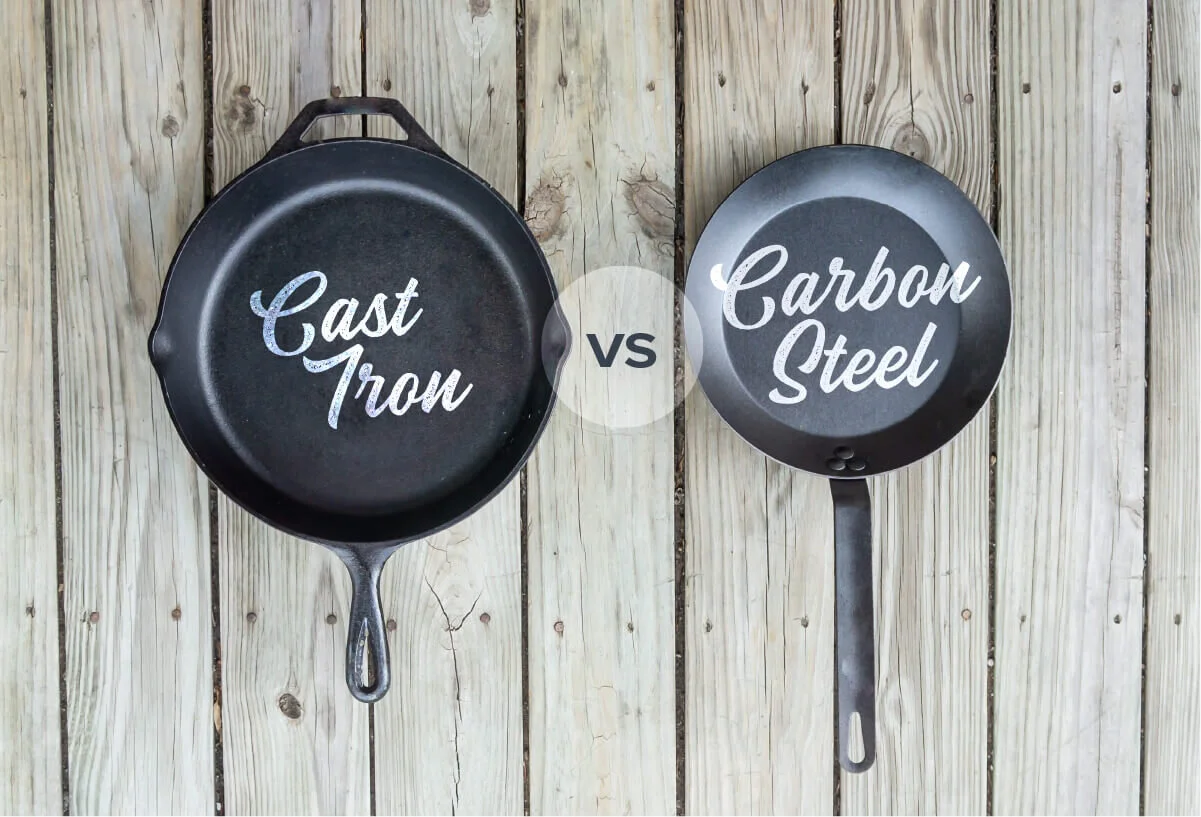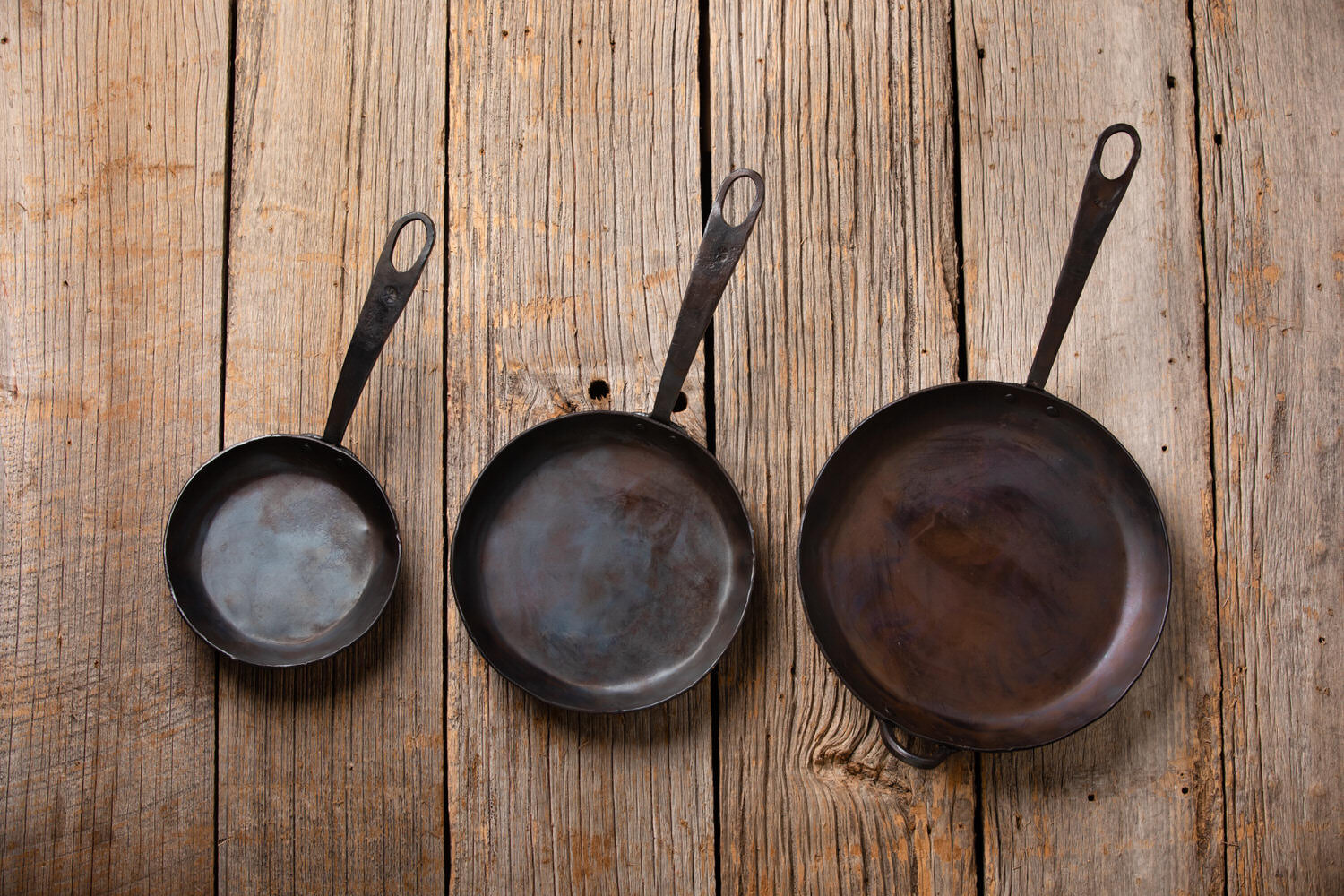(and Why You May Want to Consider Making the Switch)
Professional and hobby chefs alike LOVE the tools of their craft. The knives. The utensils. The gadgets. And, more importantly, the pans. As is the case with knives, the material a pan is made from (or forged from) makes a huge difference. Over recent years, many chefs have been switching to forged carbon steel pans for good reason. As a blacksmith, I may be a little biased, but let’s go through some of the reasons why chefs prefer carbon steel to cast iron, and I’ll let you be the judge!
First, let’s go over some definitions.
What is Cast Iron?
Cast iron is a material made by melting iron ore and pouring it into a form. Although it is a hard, strong material in some ways it is also very brittle and porous. Cast iron has been used for cookware for centuries. Some historians claim cast iron was being used as far back as the late B.C.s for cooking, but it wasn’t until the 16th century that casting techniques that produce cast iron cookware became widespread in Europe.
What is Carbon Steel?
Carbon Steel is created when iron is combined with small amounts of carbon. The carbon gives the steel strength and flexibility making it a much stronger and less brittle material than cast iron. Carbon Steel pans have been around for centuries as well, and it’s likely that for centuries a blacksmith may have been providing cookware for his community and cast iron may not have been readily available.
Benefits to Cooking with Carbon Steel Over Cast Iron
Carbon steel has several advantages:
First carbon steel cookware is virtually indestructible. Cast iron pans can be broken. If they’re dropped the handle can break off. If the pan is hot and put in water it will crack. The carbon steel pans I forge in my shop can literally be thrown against a brick wall and be no worse for the wear (challenge: try it, and send me some before and after photos!).
Carbon steel pans are thinner, which allows them to heat up more quickly. That makes carbon steel pans ideal for perfectly seared meat.
They are lighter. Let’s be real. Tossing around a cast iron pan in the kitchen can be tiresome - even to the arms of a blacksmith. ;) Try flipping ten omelets in a row and you’ll know what I mean. A carbon steel skillet? Perfect omelets every time. And enough energy left to eat it.
Carbon steel seasons more quickly because it’s much smoother than the cast iron. Because cast iron is porous, it takes a lot more time and effort to properly season.
Why Chefs Prefer Carbon Steel Cookware
Chefs prefer carbon steel for all the reasons stated above - and a couple more. Carbon steel pans tend to have longer handles, which makes it easier to flip veggies, eggs, or whatever other the subject of your saute.
And carbon steel cookware is a work of art. Cast iron is cast iron. Sure. It’s solid. It’s also durable. But carbon steel can be hand forged, like I do here in my shop. There is an intangible quality of hand forged cookware that surpasses anything mass produced. Want to be a better artist in the kitchen? It helps to have tools that are also works of art.
Quick Carbon Steel FAQs
Can carbon steel pans go in the oven?
Yes
Can carbon steel be used on induction?
Yes
Are carbon steel pans non-stick?
If cared for properly yes. They must be seasoned, kept clean, dry, and oiled.
Will it rust?
Yes, if not cared for.
Care and Maintenance
The cleaning and maintenance process is the same as cast iron. Use a little water and a scrubby to remove food debris. Don't use soap!! Soap will break down the oil residue that you want to develop. Once clean, wipe it dry and oil it regularly. Carbon steel and cast iron need to be seasoned with oil to maintain their nonstick surface. Many people prefer flax oil for seasoning.
If properly cared for, both cast iron and carbon steel will last for generations.
Why the debate?
The truth is, both cast iron and carbon steel are good to have in your kitchen. In my opinion, cast iron has been the norm for a long time and people are just learning about carbon steel, so it’s just establishing itself in the culinary world.
Although it’s good to have a variety of cookware in your kitchen most people find that once they are cooking with carbon steel kitchenware they have little need for anything else. So if you are looking for solid, high quality, cookware that will last for generations carbon steel is a clear choice!
I enjoy making pans because I enjoy making functional pieces that have an aesthetic quality to them. It makes me happy to think of my customers using these pans year after year until they become a cherished part of their culinary experience. In this throwaway culture, I wanted to create pieces that will last forever and be the only ones you need.


